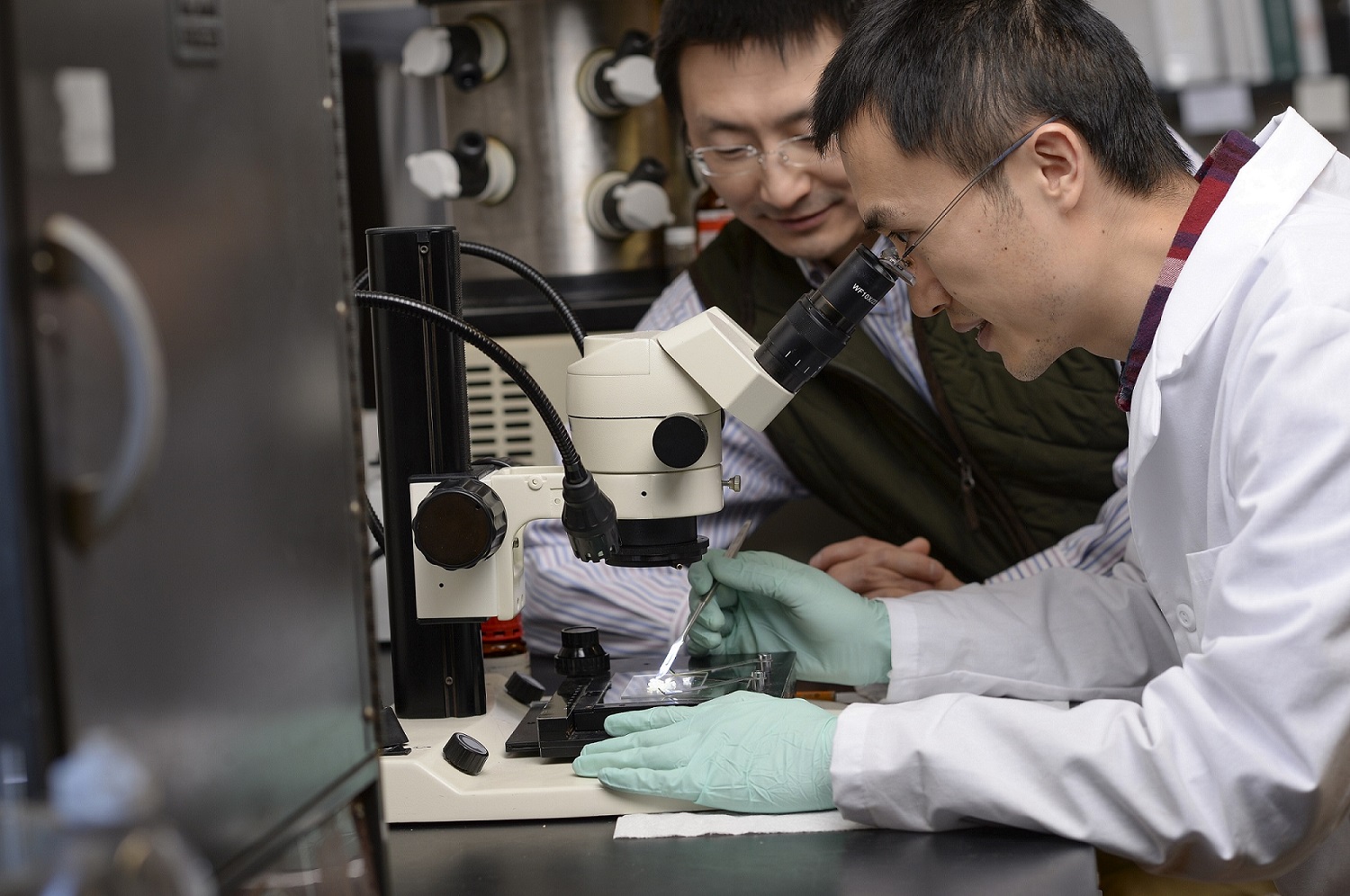Research Projects
Research is central experience promoting critical thinking and problem-solving skills that are essential for an effective career portfolio.

The research projects at the UND Chemistry department encompass a broad range of topics funded by external agencies. These include:
- Nanoscience sensors and materials
- Development and characterization of renewable materials
- Computational studies
- Atmospheric studies
In addition, in collaboration with faculty in the Department of Biomedical Science, students can also pursue biochemistry/biomedical oriented research.
Focus on Characterization of Complex Matrices Using Chromatographic Mass Spectrometric Methods
Research mentor: Alena Kubatova
- Chemical characterization of renewable chemicals from lignin
- investigation of organic constituents of air particulate matter
- LC-MS determination of resveratrol antioxidant in rat liver tissue
Nanoscience and Nanotechnology
Research mentor: Julia Zhao
Research Area
- Development of fluorescent nanomaterials for bioanalysis and bioimaging
- Development of various-nanomaterials for oil recovery and catalysis
- Development of graphene-based nanomaterials for detection of trace analytes
- Fundamental studies on nanoscience and nanotechnology
Trace Metal Analysis
Research mentor: David Pierce
Research Area
- Trace Metal analysis of environmental samples using inductively coupled plasma mass spectrometry (ICP-MS)
Investigation Applied Reaction Pathways
Research mentor: Jenya Kozliak (in collaboration with A.Kubatova)
- Study of wood aging (with Marvin Windows, Inc) using thermal desorption-pyrolysis with gas chromatography - mass spectrometry (GC-MS)
- Pathways of PAH formation in pyrolytic/combustion processes
High-Value Carbon Products and Critical Materials from Coal
Research mentor: Alexander Azenkeng
- Preparation and characterization of coal-derived graphene materials. This project can be carried out together with computational work described below.
Sustainable Materials, Photochemistry, and Organic Synthesis
Research mentor: Qianli 'Rick' Chu
Research Area
- Study and application of supramolecular chirality
- Development of photochemistry Synthesis of sustainable materials from renewables
Catalyst Development
- Preparation and characterization of new enantiopure Pd(II) complexes
- Development of new catalysts for C-C bond forming reactions
Biodegradable Polymers Synthesis and Catalysts
Research mentor: Guodong Du
- Synthesis and Development of (Bio)degradable Polymers
- Polymers with various compositions and architectures
- Utilization of carbon dioxide and flare gas
- Green Chemistry and Catalysis
Research mentor: Mark Hoffmann
Research Area
- Computational surface chemistry
- Computational combustion chemistry
High-Value Carbon Products and Critical Materials from Coal
Research mentor: Alexander Azenkeng
- Ionic liquid-based green solvents for extracting rare earth elements (REEs) and critical minerals from coal. This project can be carried out together with analytical work described above.
- The molecular mechanisms of P. aeruginosa (PA) respiratory infection and its relationship with airway inflammation (asthma and chronic obstructive pulmonary disease, COPD).
- The fundamental mechanisms of stem cell/progenitor differentiation, tissue repair, immunity, and homeostasis via knockout mice, siRNA, miRNA, advanced microscopy and chromatin immunoprecipitation.
Research mentor: Archana Dhasarathy
- The role of epigenetic events in cancer metastasis, and particularly, a process known as ‘Epithelial to Mesenchymal Transition’ (EMT), which causes cells to change their shape and migrate.
- DNA-protein interactions leading to gene regulation, including next-generation sequencing and bioinformatics.
Research mentor: James Foster
- Examination of the regulation of the dopamine transporter by the fatty acid modification, S-palmitoylation using various biochemical methods.
- Dysregulation of brain dopamine homeostasis via altered dopamine transporter function associated with schizophrenia, depression, attention-deficit hyperactive disorder (ADHD), drug abuse and Parkinson's disease.
Research mentor: Sergei Nechaev
- The role of epigenetic events in cancer metastasis, and particularly, a process known as ‘Epithelial to Mesenchymal Transition’ (EMT), which causes cells to change their shape and migrate.
- DNA-protein interactions leading to gene regulation, including next-generation sequencing and bioinformatics.
Research mentor: Keith Henry
- The interaction between antidepressants and drugs of abuse such as ecstasy, amphetamine, cocaine and bath salts with the serotonin and dopamine transporters using molecular, biochemical and pharmacological methods.
- Understanding long-lasting epigenetic changes in the brain that occur upon early life exposure to antidepressants and how these changes result in altered adult behavior.